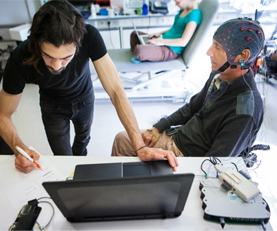 It might take years or even decades until BCI and other neurotechnologies are part of our daily lives. But technological developments mean that we are on a path to a world in which it will be possible to decode people's mental processes and directly manipulate the brain mechanisms underlying their intentions, emotions and decisions; where individuals could communicate with others simply by thinking; and where powerful computational systems linked directly to people's brains aid their interactions with the world such that their mental and physical abilities are greatly enhanced.
It might take years or even decades until BCI and other neurotechnologies are part of our daily lives. But technological developments mean that we are on a path to a world in which it will be possible to decode people's mental processes and directly manipulate the brain mechanisms underlying their intentions, emotions and decisions; where individuals could communicate with others simply by thinking; and where powerful computational systems linked directly to people's brains aid their interactions with the world such that their mental and physical abilities are greatly enhanced.
Such advances could revolutionize the treatment of many conditions, from brain injury and paralysis to epilepsy and schizophrenia, and transform human experience for the better. But the technology could also exacerbate social inequalities and offer corporations, hackers, governments or anyone else new ways to exploit and manipulate people. And it could profoundly alter some core human characteristics: private mental life, individual agency and an understanding of individuals as entities bound by their bodies.
It is crucial to consider the possible ramifications now.
Read the full article on Nature.com coauthored by Center Director and Christine Mitchell and Center Fellow Laura Specker Sullivan.
Read more about Christine Mitchell and follow her on Twitter.